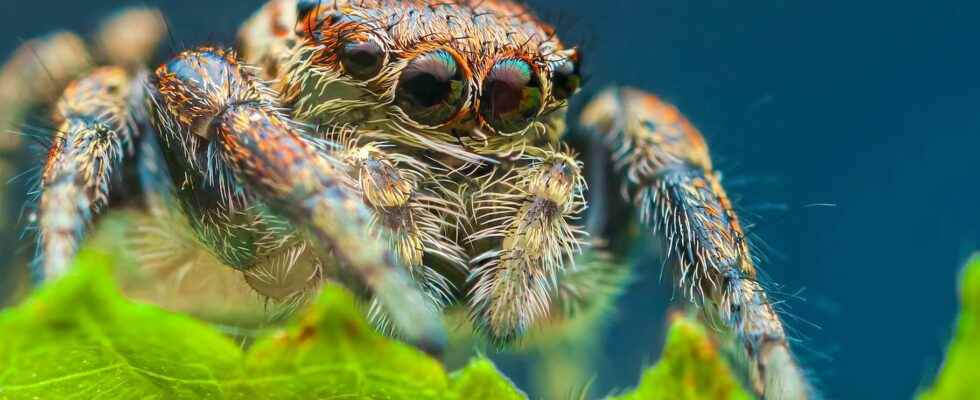You will also be interested
[EN VIDÉO] The “cloak of invisibility” of a small Australian jumping spider Arasia mullion is a jumping spider that lives in New South Wales, eastern Australia. She builds hiding places from her web and wood debris that make her almost invisible when she slips into them. A fascinating and unprecedented behavior that makes Harry Potter’s invisibility cloak almost real.
Four pairs of legs and usually no less than eight eyes. Sometimes several centimeters tall. But most often, barely a millimeter. It’s the spider. The one that scares everyone. Finally, at least to some 5% of the population. True arachnophobes for whom fear becomes panic.
To get rid of such phobiawhen the simple idea of crossing a spider triggers cold sweats and rapid heartbeat, you should consider going through a therapy called cognitive-behavioral. But, if in front of a spider, you are simply afraid, it is said that getting to know them can greatly help to overcome this emotion. Know, for example, that spiders are formidable predators. Oh, I see you coming. Predators, yes, but most of the time, harmless to humans. What spiders hunt are insects. Those who ravage our cultures. Or quite simply, the mosquitoes that tend to spoil our summer evenings.
Two species of spiders, by the way, seem to particularly like mosquitoes. They go so far as to snub other insects that come their way. Researchers call them highly specialized predators. Because the first is actually only interested in the mosquito larvae hidden inside the bamboo. The second feeds almost exclusively on female mosquitoes… gorged with blood. A way, too, it seems, for this funny spider — which is also attracted by the smell of our dirty socks — to adorn itself with a perfume that attracts potential sexual companions.
#13 Webs. So what good are they? Well, we know lots of stuff eats them, including other inverts, birds, and small vertebrates. However, spider predation takes on some interesting forms. Evarcha culicivora, a jumping spider from Africa seeks out blood fed Anopheles mosquitoes. pic.twitter.com/m1wgLqkpjF
—Don Yee (@MosquitoLab) January 4, 2021
Red-bellied mosquitoes
The nickname of this spider is Evarcha culicivora. It is a jumping spider found around the Lake Victoria (Kenya and Uganda). It does not measure more than five millimeters. But you will have understood why it is nicknamed the vampire spider!
Scientists have spent years observing it in its natural environment. That’s how they noticed his penchant for mosquitoes. And even more, for mosquitoes who have… a abdomen bright red. For us humans, this is a clear sign that the mosquito in question has just finished a tasty blood meal. But to try to understand what is going on in the heads of these spiders, the researchers imagined an experiment.
They gave some mosquitoes a red-tinted sugar water to drink. To others, the same sugar water, this time tinged with gray. The first came out with red bellies. The second, the gray belly. And without hesitation, the spiders began to hunt those who had drunk the red water. A way to show that the smell of mosquitoes, therefore, plays no role in the food choice of these tiny vampires. One more step to finally understand how spiders can fix their attention and make decisions. With their if small brain and a sensory system radically different from ours. One more step, perhaps to show that spiders… aren’t so stupid!
Incidentally — or not so much, in fact — researchers’ efforts to better understand what goes on in the heads of mosquito-eating spiders could shed light on the fight against this disease. disease-carrying insect.
Right now, receive the Mag Futura for free by subscribing to our subscriptions!
Did you know that you can access Futura without ads via our subscriptions?
At the moment, you can discover this advantage with our special offer: subscribe to the subscription “I participate in the life of Futura” (for a minimum of 3 months) and receive the Mag Futura at home* (worth €19)!
*Mag Futura is sent after the third month of registration.
Interested in what you just read?

